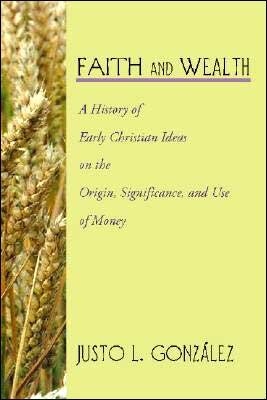Justo Gonzalez, Faith and Wealth: A History of Early Christian Ideas on the Origin, Significance, and Use of Money. Wipf and Stock, 2002.
LifeandLeadership.com Summary
Gonzalez is a respected historian and liberation theologian, so one must expect his history of faith and wealth to be interpreted through that rubric. To understand liberation theology, see the description by Sam Storms and the critique by Ben Witherington. This actually elevates his book as an important tool for one’s understanding of wealth in the New Testament and the early church, whether or not one agree’s with his conclusions. Our understandings of history and theology are influenced by our cultural lenses. These lenses often need challenging. For evangelical Christians whose faith has been shaped in economically advantaged, social-majority environments, Gonzalez may provide a good balance to their grasp of the biblical teaching on money and possessions.
In this volume, Gonzalez gives attention to the teachings and practices of the early church and surrounding cultures relative to wealth, and then considers the progression of thought through the time of Augustine. Part One, Background, begins by surveying the economic philosophies of Greeks, Romans, and Jews which served as the cultural backdrop of early Christianity. An entire chapter is devoted to the Roman economy as it impacted agriculture, industry, trade, and taxation. It chronicles this history from New Testament times, to the economic crisis of the third century, and on to the times of Diocletian and Constantine. Part Two, Before Constantine, goes back again to the primitive church as reflected in the New Testament, with emphasis on the meaning of koinonia. It includes a discussion of Jesus’ first disciples, the first urban Christian communities, and the latter books of the New Testament. From there, it presents a summary of teachings via the homilies and moral exhortations of the Apostolic Fathers, highlighting the Didache, Barnabas, the Epistle to Diognetius, Hermas, Irenaeus, Clement of Alexandria, Tertullian, Cyprian, and other early teachers and apologists. Part Three, Constantine and Beyond, presents the viewpoints of the desert fathers, Ambrose, Jerome, John Chrysostom, Augustine, and others.
This book is indeed more of a survey than an evaluation, thus one may still come away wanting more analysis of ideas such as the Fathers’ exaltation of poverty. For ministers, the more valuable section will be Parts One and Two as a tool toward better understanding the social background of New Testament teaching on wealth. As such it may be a good supplement on Craig Blomberg’s Neither Poverty Nor Riches and Ben Witherington’s Jesus and Money.
From the Publisher
Ideas pertaining to economics and social order were central concerns of the early Christian church, yet modern theologians and scholars have paid little or no attention to these issues as important theological questions. This brilliant and thorough study is a history of the views that Christians held of the origin, significance and use of wealth. Justo Gonzalez examines early Christian ideas, beliefs and teachings about the use of money, property, communal sharing and the rights and obligations of rich and poor.
Setting the Christian community in the political, social and economic contexts of the times, Gonzalez highlights the ideas of such prominent writers as Cyprian, Ambrose, Augustine, John Chrysostom, and the Desert Fathers concerning wealth, noting what traditional scholarship has overlooked. As the author points out, this book is not a social or economic history of Christianity during the first four centuries; it is a history of the views that Christians held on economic matters.
This profound, enlightening and highly readable work of excellent scholarship is a major contribution to the study of the history of Christian thought. It clearly demonstrates that the issues of economics and social justice are central theological concerns, deeply rooted in Christian doctrine and Christian tradition.
About the Author
Justo L. Gonzalez, a United Methodist minister born in Cuba, is a retired member of the R’o Grande Conference of the United Methodist Church. After his basic college and seminary education in Cuba, he studied at Yale University, where he obtained three degrees: S.T.M. (1958), M.A. (1960) and Ph.D. (1961). In 1961 he joined the faculty of the Evangelical Seminary of Puerto Rico, teaching historical theology, and in 1969 he moved to Atlanta, where he now resides, in order to teach at Candler School of Theology (Emory University). Since 1977 he has been engaged in two main occupations: writing and promoting the theological education of Latinas and Latinos.
Among his numerous writings in the field of Church History are his three-volume A History of Christian Thought, and the two volume set on The Story of Christianity. These and others of his books have been published not only in English and Spanish, but translated as well into Portuguese, German, Russian, Korean and Chinese.
***For additional information on this resource, including reviews, click the bookstore links. Check the reference at page top or the links below for resource guides on related topics.***
See Other Resource Guides on Christian Social Ministry:
- Theological and Philosophical Foundations of Social Ministry
- Spirituality for Ministry of Social Compassion and Justice
- Strategies For Christian Social Ministry
- Perspectives and Strategies For Social Ministry Among the Urban Poor, Urban Ministry
- Christian Perspectives on Political Theory and Church-State Relations
- Christian Perspectives on Economics and Public Policy
See Resources on Over 100 Areas of Ministry Leadership:


